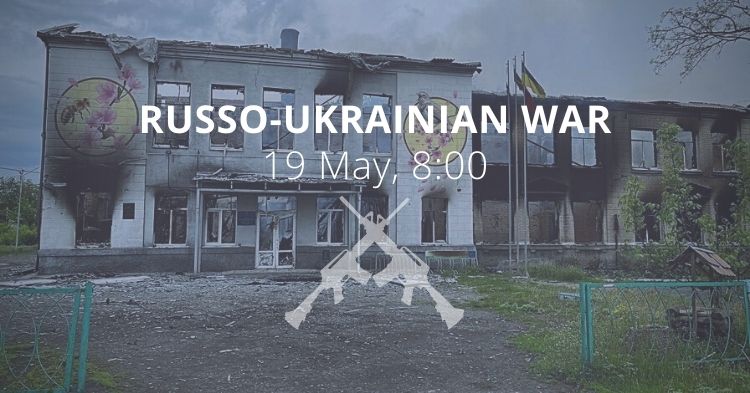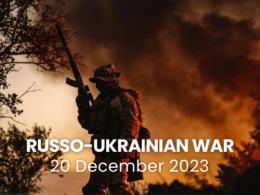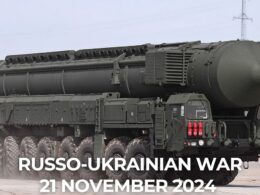Ukrainian guerrillas blew up a Russian armored train in occupied Melitopol. Meanwhile, Russia stays focused on preparing the assault on the government-controlled part of Luhansk Oblast, intensifies operations around Lyman, keeps bombing Mariupol's Azovstal plant.
Morning report day 85 – May 19
The report is based on media reports, expert analyses, and official information posted online.
Situation
According to information from the General Staff as of 06.00 19.05.2022, supplemented by its [18:00 assessment].
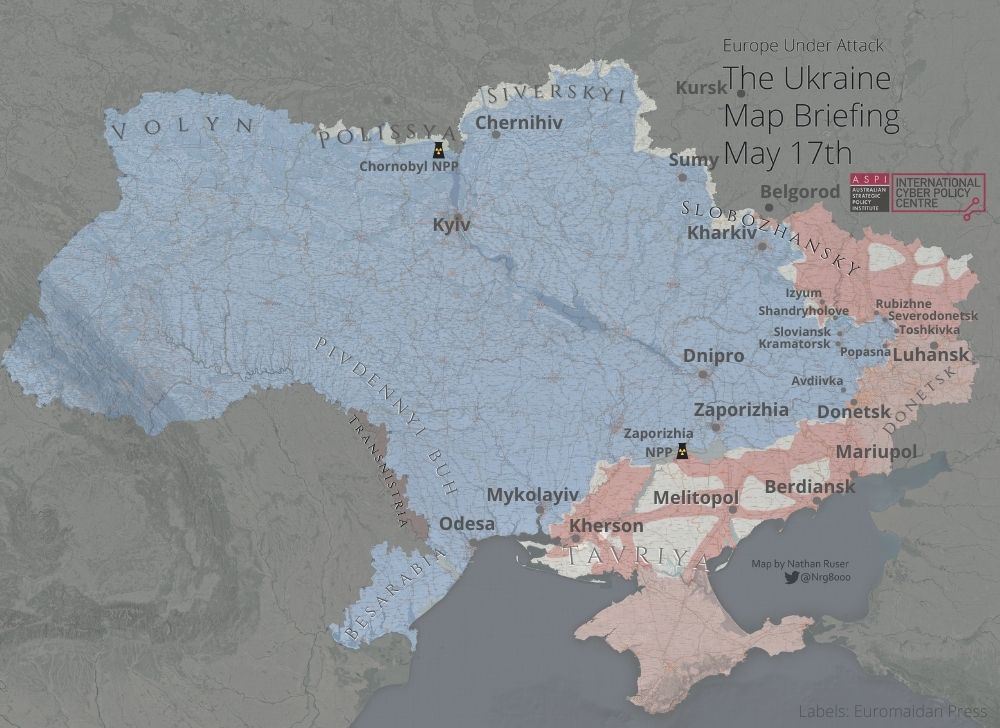
The situation in the Volyn and Polissia directions remains without significant changes. The threat of missile and bomb strikes remains from the territory of the Republic of Belarus on the objects of civil and military infrastructure on the territory of Ukraine.
- [Certain units of the Armed Forces of the Republic of Belarus continue to carry out tasks to cover the Ukrainian-Belarusian border. The second stage of the combat readiness check is underway in the Armed Forces of the Republic of Belarus until May 21. Issues of forcing water barriers and checking the next forces and means of air defense are being worked out.]
In the Siverskyi direction, Russian forces units continue to equip additional firing positions and defensive structures in the border areas of the Bryansk and Kursk regions.
- Russian forces fired artillery and mortars at settlements in the Chernihiv and Sumy oblasts and fired missiles at the Desna settlement. Russian forces continue attempts to conduct air reconnaissance with the help of UAVs in this direction.
- [Russian forces units fired artillery and mortars at the settlements of Yanzhulivka and Progres, Chernihiv and Sumy oblast, respectively.]
- [Russian forces conducted air reconnaissance with the use of UAVs to identify units of Ukrainian troops, artillery positions and deployment routes.]
- [According to available information, units of the Armed Forces of the Russian Federation, stationed in the border areas of the Kursk region, are replenishing supplies of logistics and ammunition.]
[In the Slobozhanskyi direction, in the border areas of the Belgorod and Voronezh regions, Russian occupiers continue to keep units of the 32nd Air Defense Division of the 6th Air and Air Defense Forces Army of the Armed Forces of the Russian Federation ready for use.]
- In the Kharkiv direction, the main efforts of Russian occupiers were focused on maintaining the occupied borders, and conducting counterattacks to restore lost positions. The use of sabotage and reconnaissance groups by the enemy is noted. [Yesterday, Russian forces tried to counterattack in order to restore the lost positions.]
- [As a result of the offensive of Ukrainian troops, the settlement of Dementiivka was liberated. Russian forces are advancing in the area of the settlement of Ternov, fighting continues.]
- In the Sloviansk direction, Russian forces are trying to improve the tactical situation. With the support of artillery, it fought in the area of the settlement of Velyka Komyshuvakha, had no success, suffered significant losses in some areas and was forced to withdraw to previously occupied positions. [Yesterday, Russian occupiers, with the support of artillery, fought in the Dovhenke area, had no success, and suffered losses. Russian forces increased the intensity of air reconnaissance with the use of UAVs.]
[In the Donetsk direction, Russian forces fired on the positions of units of Ukrainian troops along the line of contact from the entire spectrum of weapons, including aircraft.]
- In the Lyman direction, Russian forces fired on civilian infrastructure, fired missiles, and tried to gain a foothold in previously occupied positions. It used operational-tactical and army aircraft to destroy civilian objects in the areas of the settlements of Loskutivka, Katerynivka, Novomykhailivka, and Orikhove. [Yesterday, the enemy used aircraft to strike at civilian targets in the areas of Toshkivka, Zolote, Avdiivka, Volodymyrivka and Vodiane.]
- In the Sievierodonetsk direction, Russian occupiers launched an offensive and carried out assault operations in the area of the settlement of Ustynivka, but were unsuccessful. [Yesterday, Russian forces carried out assault operations in the area of the settlement of Nizhne, without success.]
- In the Bakhmut direction, Russian forces launched an offensive to improve the tactical situation. He tried to carry out assault operations in the area of Zolote-4 but was unsuccessful. [Yesterday, it carried out assault operations in the area of the settlement of Katerynivka, has no success.]
- In the Avdiivka direction, Russian forces carried out offensive operations in the area of the settlement of Yuriyivka, suffered losses and retreated. Russian forces were not successful as a result of assault operations in the areas of Novokalynove and Pervomaiskoye. [Yesterday, Russian forces conducted offensive operations in the area of the settlement of Novoselivka, suffered losses, and retreated. The assaults of the Russian occupiers near the settlements of Novobakhmutivka and Vesele were unsuccessful.]
- In the Kurakhove direction, Russian forces unsuccessfully launched an offensive near the village of Novomykhailivka. [Yesterday, they launched an offensive in the area of the settlement of Pobeda, without success.]
- Sixteen enemy attacks were repulsed in the Donetsk and Luhansk directions last night, eight tanks, seventeen units of armored combat vehicles, four special armored vehicles and six conventional enemy vehicles were destroyed.
Russian forces did not conduct active hostilities in the Novopavlovsk and Zaporizhzhia directions. The fire of MLRS, artillery and mortars affected the infrastructure and peaceful housing in the areas of the settlements of Huliaipilske, Novodanylivka, Malynivka and Huliaipole. [Yesterday, they shelled Novoandriyivka, Kamianske, Orikhove, Olhivske and Poltavka.]
- According to the available information, in the area of the settlement of Oleksandrivka, to replenish the losses of the 107th Rifle Battalion, which amounted to more than 50%, a replenishment of 260 servicemen arrived, who were previously involved in the Kharkiv direction.
The invaders did not carry out active hostilities in the Pivdennyy Buh direction. The main efforts are focused on maintaining the occupied borders. The enemy fired mortars, barrel and jet artillery in the areas of the settlements of Lymany, Pryshyb, Trudolyubivka and Novovorontsovka. [Yesterday, the enemy fired on the settlements of Lupareve, Posad-Pokrovske, Vysunsk, Osokorivka and Novovorontsovka. Russian forces continued the measures of engineering equipment positions. To adjust the artillery fire, it used the Orlan-10 UAV.]
- No significant changes have been recorded in the Besarabian direction
In the absence of mobilization resources in the temporarily occupied territories of Donetsk oblast, the occupation military command plans to involve students of higher educational institutions in hostilities.
[According to available information, spontaneous protests of members of the families of persons who were forcibly mobilized into the ranks of the Russian occupation forces took place on May 16-17 in the temporarily occupied territory of Luhansk oblast. Protests were recorded in Luhansk and Rovenky. The main requirement is to return the mobilized home.]
During the previous day, anti-aircraft missile units destroyed one plane and a cruise missile. Strike aircraft of the Air Force struck at the accumulation of enemy equipment, according to preliminary data destroyed about 20 armored vehicles, ammunition and personnel.”
Guerrillas blow up a Russian armored train in captured Melitopol, the Ukrainska Pravda reports, citing local media; and Mirror of the Week, quoting the Defense Headquarters of the Zaporizhzhia region.
“Eyewitnesses in Melitopol reported hearing explosions and gunfire in the area of the meat-packing plant. Local journalists later confirmed that Ukrainian guerrillas had remotely detonated an armored train near the meat-packing plant in Melitopol. The train consisted of 10 cars. The explosion was carried out under a car carrying personnel from Russian occupying units, who were rotating. The explosion damaged two railway tracks. The armored train has now been stopped, and the fuel and lubricant cars following the armored train have also been blocked.”
https://twitter.com/RF200_NOW/status/1526900332927676416
Russian aircraft were shot down in the Kharkiv region, pilots catapulted, the Ukrainska Pravda reports.
All 10 warships and 4 submarines of the Russian Black Sea Fleet, carriers of the cruise missile "Caliber," are in readiness for missile strikes on Ukraine, the Centre for Defense Strategies reports. In addition, they are planning to transfer to the Black Sea up to 3 ships of the Caspian flotilla, which are also carriers of the "Caliber" cruise missiles. The repair of the Alrosa submarine (project 877) in Sevastopol, which was also modernized for firing the Caliber missile system, was expeditiously completed. Thus, the total volley of the Russian Federation's CM "Caliber" from the Black Sea can be up to 124 missiles. The enemy continues to launch missile strikes from the sea at Ukrainian targets. The Russian Federation is equipping Zmiiny (Snake) Island for surveillance activities. A naval group of landing forces consisting of 11 ships (4 fire support ships and 7 landing ships) is in the Black Sea.
Ukrainian Chief Intelligence Directorate: The Russian army openly refuses to fight in Ukraine, the Ukrainska Pravda reports. Ukrainian intelligence officers state that Russian occupiers are increasingly refusing to carry out the orders of the command to conduct active offensive operations on the territory of Ukraine, according to the Defense Intelligence of Ukraine (DIU). According to DIU, several units of the 70th guard motorized rifle regiment have already openly refused to take part in the war and demanded to return to their places of permanent deployment.
"The most active soldiers who demand to return to the territory of Russia were sent to the most dangerous part of the front, with a hope for their quick death. In order to identify and neutralise the initiators of the refusal to take part in the war, the FSB unit of the 58th Combined Arms Army decided to reinforce the units of the 70th regiment with their freelance agents and informants."
According to British Defense Intelligence, (last 24 hours):
- In recent weeks, Russia has fired senior commanders who are considered to have performed poorly during the opening stages of its invasion of Ukraine.
- Lieutenant General Sergei Kisel, who commanded the elite 1st Guards Tank Army, has been suspended for his failure to capture Kharkiv. Vice Admiral Igor Osipov, who commanded Russia’s Black Sea Fleet, has also likely been suspended following the sinking of the cruiser Moskva in April. Russian Chief of the General Staff Valeriy Gerasimov likely remains in post, but it is unclear whether he retains the confidence of President Putin.
- A culture of cover-ups and scape-goating is probably prevalent within the Russian military and security system. Many officials involved in the invasion of Ukraine will likely be increasingly distracted by efforts to avoid personal culpability for Russia’s operational set-backs. This will likely place further strain on Russia's centralised model of command and control, as officers increasingly seek to defer key decisions to their superiors. It will be difficult for Russia to regain the initiative under these conditions.
As of Thursday 19 May, the approximate losses of weapons and military equipment of the Russian Armed Forces from the beginning of the war to the present day:
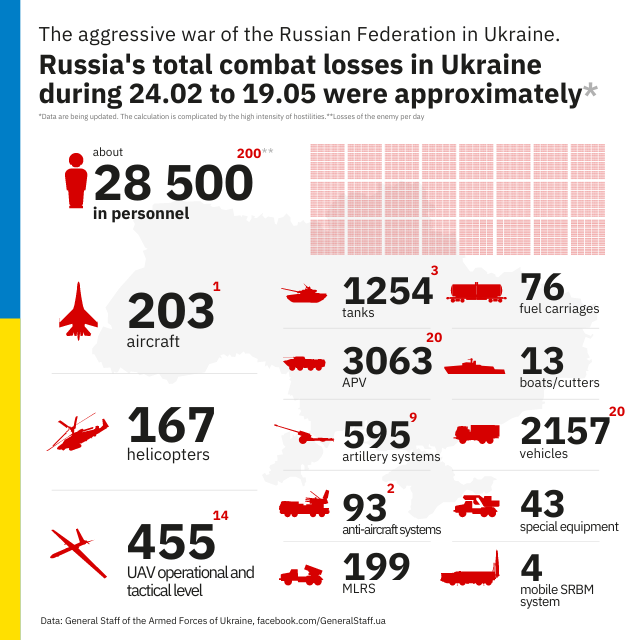
Russian enemy suffered the greatest losses (of the last day) in the Sloviansk, Kryvyi Rih, and Zaporizhzhia directions.
Humanitarian
More Ukraine fighters surrendering in Mariupol, Russia says, the Reuters reports. “Russia said on Wednesday an additional 694 more fighters had surrendered, bringing the total number to 959. Its defense ministry posted videos of what it said were Ukrainian fighters receiving hospital treatment after surrendering at Azovstal. Ukraine confirmed the surrender of more than 250 fighters on Tuesday but did not say how many more were inside.”
According to UNHCR 6,312,255 refugees have been registered as of May 17. The UN says that so far Poland has taken in 3,396,792 refugees, Romania 930,341, Russian Federation 863,086, Hungary 615,256, Republic of Moldova 465,435, Slovakia 426,605 and Belarus 27,308. Among those who fled Ukraine are also Ukrainian nationals with dual citizenship. An additional 105,000 people moved to the Russian Federation from the Donetsk and Luhansk regions between 18 and 23 February.
The number of Ukrainians entering Ukraine since February 28 is 1,853,500 as of May 17. This figure reflects cross-border movements, which can be pendular, and does not necessarily indicate sustainable returns.
OHCHR recorded 7,964 civilian casualties in Ukraine as of May 17. 3,778 were killed (including 251 children) and 4,186 injured (including 382 children).
Environmental
The sea of Azov is under threat of complete extinction due to Russian bombardment, the Ukrinform reports. "There is a threat of complete extinction of the Sea of Azov. The bombardment of Azovstal could damage a technical facility that restrains tens of thousands of tonnes of concentrated hydrogen sulfide solution. The leak will completely kill the flora and fauna of the Sea of Azov," the Mariupol City Council posted on Telegram.
It is noted that dangerous substances may further get into the Black Sea and the Mediterranean Sea. According to Mariupol Mayor Vadym Boychenko, international experts and the UN must be granted immediate access to the facility to examine the situation and prevent a global environmental catastrophe.”
Legal
Human Rights Watch collects evidence of Russian atrocities in Kyiv and Chernihiv regions, the Ukrinform reports. The international human rights organization Human Rights Watch has collected facts about the executions and torture of Ukrainians during the Russian occupation of the Kyiv and Chernihiv regions. The study was presented on the HRW website.
"Russian forces controlling much of the Kyiv and Chernihiv regions in north-eastern Ukraine from late February through March 2022 subjected civilians to summary executions, torture, and other grave abuses that are apparent war crimes," HRW said.
In 17 villages and small towns in the Kyiv and Chernihiv regions visited in April, Human Rights Watch investigated 22 apparent summary executions, 9 other unlawful killings, 6 possible enforced disappearances, and 7 cases of torture. Twenty-one civilians described unlawful confinement in inhuman and degrading conditions.
"The numerous atrocities by Russian forces occupying parts of north-eastern Ukraine early in the war are abhorrent, unlawful, and cruel," said Giorgi Gogia, associate Europe and Central Asia director at Human Rights Watch. According to him, these abuses against civilians are evident war crimes that should be promptly and impartially investigated and appropriately prosecuted. "Justice may not come quickly, but all steps should be taken to ensure that those who suffered see justice someday soon," Gogia said.
231 children were killed, and 427 children injured, the Office of the Prosecutor General of Ukraine reports as of May 19. 1,828 educational establishments are damaged as a result of shelling and bombings, 171 of them are destroyed fully. 12,595 crimes of aggression and war crimes and 5,882 crimes against national security were registered.
Support
EU's sixth package of sanctions against Russia
- EU needs a few more days for the next sanctions package on Russia, the Reuters reported on Monday.
- EU’s Russia sanctions effort slows over oil dependency, AP News reported the same day. The European Union’s efforts to impose a new round of sanctions against Russia over the war in Ukraine appeared to bog down on Monday, as a small group of countries continued to oppose a ban on Russian oil imports.
- Hungary ‘holding EU hostage’ over sanctions on Russian oil, The Guardian reported. Lithuania’s foreign minister, Gabrielius Landsbergis, said: “Unfortunately the whole union is being held hostage by one member state.” He was referring to Hungary, which continues to block the oil embargo, despite being offered an extension on phasing out Russian crude until the end of 2024.
- As a consequence, the headline in TASS (itself having become blocked by EANA) yesterday read: Sixth package of EU sanctions against Russia blocked — European Commissioner. The Russian propaganda outlet offers the following assessment “Hungary opposes the oil embargo, with the support of a number of other countries who believe that the damage from the measure will be catastrophic for Europe.”
https://twitter.com/EuromaidanPress/status/1527030809118625792
European Commission proposes up to EUR 9B in more aid to Ukraine, the Ukrinform reports. "We are proposing for Ukraine to top up the significant short-term aid that we've provided until now with a new exceptional macro-financial assistance to Ukraine of up to EUR 9 billion in 2022. This for the short term, for the relief right now, to support the government, [to provide] budget support," European Commission President Ursula von der Leyen said after a meeting of the European Commission.
"We know that Ukraine is on the front line, defending our European values. We will continue to be by their side throughout this war and when they rebuild their country. […] Of course, we need to think about the day after and the wider reconstruction efforts. And here the European Union has a responsibility, and the European Union has a strategic interest in leading this reconstruction effort, von der Leyen said.
Japan to double fiscal support for Ukraine to $600 million, PM says, the Reuters reports. “Japan will double fiscal aid for Ukraine to $600 million in a coordinated move with the World Bank to back the country's near-term fiscal necessities damaged by Russia's invasion, Prime Minister Fumio Kishida told reporters on Thursday.”
New developments
- The Kremlin has stated that Kyiv doesn’t want to continue negotiations, the Ukrainska Pravda reports citing the Kremlin-aligned Russian news agency RIA Novosti. “The Russian Foreign Ministry has said that negotiations with Ukraine are not taking place since Kyiv has effectively withdrawn from the negotiation process. Mykhailo Podoliak, Adviser to the Head of the Ukrainian President's Office, confirmed that talks with Russia are currently on pause for a number of reasons.”
- Russia expels 85 diplomats from France, Spain and Italy, the Reuters reports. The Foreign Ministry on Wednesday said it was ordering out 34 diplomatic staff from France, 27 from Spain and 24 from Italy in response to similar moves by those countries, highlighting the damage to relations with leading European Union members since it launched its war on Ukraine. The three countries are among European nations that have collectively thrown out more than 300 Russians since the Feb. 24 invasion.
- Finland and Sweden apply to join NATO amid Turkish objections, the Reuters reports. “Finland and Sweden formally applied to join the NATO alliance on Wednesday, a decision spurred by Russia's invasion of Ukraine, but face objections from Türkiye to an accession process that is expected to take only a few weeks. Neutral throughout the Cold War, Sweden's and Finland's decision to join NATO is one of the most significant changes in Europe's security architecture in decades, not least because Finland shares a 1,300-km (810-mile) border with Russia”.
- Türkiye blocks the start of talks on Finland and Sweden joining NATO, The Washington Post reports. “Türkiye blocked the start of Finland’s and Sweden’s NATO accession talks Wednesday shortly after the Nordic nations submitted their formal applications, a signal of what could be a bumpy process to expand the alliance and reshape Europe’s post-Cold War security architecture. Türkiye’s resistance deprived Secretary-General Jens Stoltenberg of the consensus he needed to move forward with the membership process.” [ME: On this historic day, Türkiye chooses to be on the wrong side of history. So far, only Russia and Türkiye have voiced opposition to the NATO extension.]
- The European Alliance of News Agencies (EANA) has approved a decision by the Alliance's Council to suspend the membership of the TASS News Agency (Russia), the Ukrinform reports. “We are dealing with a Russian state institution, which, following the criminal instructions of Russia's top leadership, has been spreading false lies and misinformation for years. Accordingly, the agency is one of the most important cogs and tools in Russia's system of propaganda and withholding the truth. […] TASS has become an active participant in the Kremlin's criminal actions against our country. Therefore, the Russian agency has neither moral nor professional grounds to remain in such an authoritative circle as the European Alliance of News Agencies," Ukrinform Director General Oleksandr Kharchenko said in his speech.”
- President Zelenskyy has submitted to the Verkhovna Rada of Ukraine a bill on extending martial law. This was reported by Ukrinform, citing the parliament's website.
- Russia to use BWC in relation to the US over military biological research in Ukraine reports, the TASS reports. “Moscow will resort to articles 5 and 6 of the Convention on the Prohibition of the Development, Production and Stockpiling of Bacteriological (Biological) and Toxin Weapons and on their Destruction to investigate [its fake claims about] Washington’s research into biological weapons in Ukraine, Russian Foreign Ministry spokeswoman Maria Zakharova told a news briefing on Wednesday.” The article describes alleged evidence and admission of guilt, as well as claimed US concerns of “Russian forces, may be seeking to gain control of the labs” and that the US allegedly are “working with the Ukrainians on how they can prevent any of those research materials from falling into the hands of Russian forces". [ME: The claims of so-called “US Department of Defense-funded military biological program in Ukraine” has been repeatedly reputed as fake but keep being fronted by Russian propaganda outlet. The reason for including it in my report is that these kinds of allegations often mirror Russian intent to create a False-flag operation or justify future assaults/operations.]
It is Day 84 of Russia's "taking-Kyiv-in-2-days" special operation. As you can see, everything goes just precisely "according to plan" (c)
The articles on the screenshot were published three months apart
H/t Victor Tregubov pic.twitter.com/ydA15c9lX0
— Euromaidan Press (@EuromaidanPress) May 19, 2022
Assessment
On the War
The Institute for the Study of War has made the following assessment as of Wednesday 18 May:
The announced plan to turn Mariupol into a center of tourism and leisure following the complete destruction of a major center of economic activity in Mariupol, is indicative of the damage that Russian troops have inflicted on themselves through the destruction of Mariupol. Russia does not need another resort town on the Black Sea. It does need the kind of hard currency that a plant like Azovstal had generated.
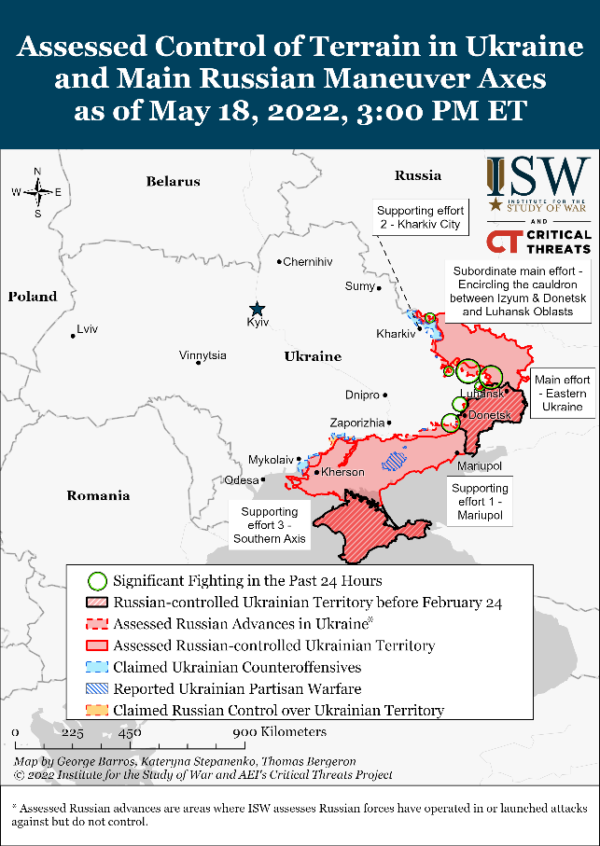 The Kremlin may hope to offset the loss of revenues from Azovstal and other destroyed infrastructure in Ukraine by profiting from the Zaporizhzhia Nuclear Power Plant that its forces have seized. Russian Deputy Prime Minister Marat Khusnullin announced that he will allocate maximum integration assistance for Zaporizhzhia Oblast to work in a “friendly Russian family” during his visit to Melitopol on May 18. Khusnullin added that the Zaporizhzhia Nuclear Power Plant will exclusively work for Russia and will sell electricity to Ukraine. This statement is a clear Russian recognition that there will be an independent Ukraine at the end of this war and that Russia seeks to restore its energy leverage over Ukraine and possibly the West more broadly that has been reduced by sanctions and efforts to reduce reliance on Russian energy. It also reinforces the urgency of helping Ukraine regain control of Enerhodar City and the rest of its occupied territory to forestall this renewed economic thralldom. ISW previously reported that Russian forces started digging trenches and blocking highways to Enerhodar City. The Zaporizhzhia Oblast Military Administration reported that Russian occupation authorities continued to prepare for a referendum in Enerhodar City on May 18.
The Kremlin may hope to offset the loss of revenues from Azovstal and other destroyed infrastructure in Ukraine by profiting from the Zaporizhzhia Nuclear Power Plant that its forces have seized. Russian Deputy Prime Minister Marat Khusnullin announced that he will allocate maximum integration assistance for Zaporizhzhia Oblast to work in a “friendly Russian family” during his visit to Melitopol on May 18. Khusnullin added that the Zaporizhzhia Nuclear Power Plant will exclusively work for Russia and will sell electricity to Ukraine. This statement is a clear Russian recognition that there will be an independent Ukraine at the end of this war and that Russia seeks to restore its energy leverage over Ukraine and possibly the West more broadly that has been reduced by sanctions and efforts to reduce reliance on Russian energy. It also reinforces the urgency of helping Ukraine regain control of Enerhodar City and the rest of its occupied territory to forestall this renewed economic thralldom. ISW previously reported that Russian forces started digging trenches and blocking highways to Enerhodar City. The Zaporizhzhia Oblast Military Administration reported that Russian occupation authorities continued to prepare for a referendum in Enerhodar City on May 18.
Ukrainian officials reported protests in Donetsk and Luhansk People’s Republics (DNR and LNR) over forced mobilizations on May 16-17. The Ukrainian Military Intelligence Directorate (GUR) reported that relatives of the forcefully mobilized LNR servicemen demanded an immediate return of their family members from combat in Luhansk City and Rovenky approximately 50 kilometers west of Russian border. The GUR noted that perceptions of war and resentment of mobilization in LNR worsened because of the high casualties’ Russian forces have suffered and the fact that Russian authorities are reportedly evading payments to the families of wounded and killed servicemen. Mariupol Mayor’s Advisor Petro Andryushenko had previously reported that a protest against mobilization had occurred in Donetsk City on May 16.
Key Takeaways
- Russian forces are continuing to inflict air and artillery strikes on the Azovstal Steel Plant, indicating that a remnant of Ukrainian defense is still in the plant despite evacuations over the last few days.
- Russian occupying authorities are reportedly planning to level the Azovstal Steel Plant after completing its capture, which directly undermines the large strategic economic importance of capturing the plant.
- Russian forces continued to prepare for an assault on Sievierodonetsk and intensified operations around Lyman.
- Russian forces continued to prioritize holding positions around the Russian border to prevent further Ukrainian advances north of Kharkiv City and will likely continue to do so at the expense of deploying additional reinforcements to other axes of advance.
- Russian troops focused on maintaining their positions on the Southern Axis and on conducting rocket, missile, and artillery strikes along the frontline.“[/box]
With troops in Ukraine, Russia's defense spending leaps 40%, the Reuters reports. “Russia's defense spending was up nearly 40% in the first four months of the year, according to preliminary data released by the finance ministry on Wednesday, almost three months into Moscow's large-scale military campaign in Ukraine. Russia spent 1.7 trillion roubles ($26.4 billion) on defense between January and April, almost half the 3.5 trillion roubles, or 2.6% of GDP, budgeted for all of 2022.”
Consequences and what to do?
It is senseless to shelter Putin from the sense that he is losing. He will figure that out for himself, and he will act to protect himself, the renowned professor of history and author, Timothy Snyder, argues. Russians are not cornered. The Russian army is not cornered. It is an invading force. When defeated, units just retreat across the border to Russia.
Putin rules in virtual reality, where there is always an escape route. He cannot be cornered in Ukraine, because Ukraine is a real place. It is hard for people in other societies to grasp that Putin is a dictator who controls his country's media. He rules by changing the subject. Putin changes the subject all the time. The last time Russia invaded Ukraine, its media changed the subject to Syria from one day to the next, and the Russians went along. When Russia invaded Ukraine this February, the media quickly adjusted from saying that the invasion was impossible to saying it was inevitable. Russians went along.
If defeated in reality, Putin will just declare victory on television, and Russians will believe him or pretend to. He does not need our help for that.
It is senseless to create an "off-ramp" in the real world when all Putin needs is one in a virtual world he completely controls. Talking of "off-ramps" just gives Russian leaders something to laugh about in what are otherwise difficult times. To be sure, Putin might err and wait too long to declare victory in the virtual world. In that case, he loses power. We cannot save him from such a misjudgement, and it is misguided to try.
Putin's power over media will be complete until the moment when it ceases. There is no interval where our actions in the real world will make a difference. Either our off-ramps are unnecessary, or they are irrelevant.
It is grotesque to ask the Ukrainians to make decisions about the war for the comfort of Russian television producers, who don't take direction from the real world anyway. Misunderstanding Russia through clichés of "cornering" and "off-ramps" will make the war last longer, by distracting from the simple necessity of Russian defeat.
Ukraine is a very different story. Zelensky, unlike Putin, is democratically elected, feels responsible for his people, and governs in a world where others matter. Ukraine has a press that the government does not direct. Zelensky cannot simply change the subject. He has to bring his people along on any major decision. Unlike Putin, Zelensky has to make a case to his people to end this war. He, therefore, does need help, both to win the war and in telling Ukrainians what comes next.
Unlike Russian soldiers, Ukrainians have nowhere else to go. They cannot just go home. The war is fought in their country. They will return to their homes and rebuild. Ending the war means thinking more about the Ukrainian people and their future and worrying less about problems that Putin does not have.
ME: The risk of collateral damage to shipping in the northwestern, western, and southwest Black Sea is assessed as high by NATO.
Drifting mines have been detected and deactivated in the Western Black Sea by coastal nation's authorities. The latest statements of regional authorities, confirming another sighting of a mine, show the threat of drifting mines in the Southwest part of the Black Sea still exists.
“The threat of collateral damage or direct hits on civilian shipping in the War Risk Area of the Black Sea area remains high. The threat of GPS jamming, AIS spoofing, communications jamming, electronic interference, and cyber-attacks in the area are also considered high. Harassment and diversion of shipping in the area cannot be excluded.”
According to the US Maritime Administration, commercial vessels are advised to avoid entering or approaching the Sea of Azov, Ukrainian ports, or Ukrainian territorial waters in the north-western Black Sea.
Ukraine is being denied access to its maritime resources. These encompass the ability to harvest the economic benefits from merchant shipping, sea transport, shipbuilding, and ship repair, as well as the exploitation of living marine resources and inanimate seabed resources, tourism, and recreational activities. It has also impacted activities in the fields of science, education, ecology, and marine protection. Losing these will have grave consequences for Ukraine’s ability to ensure a sustainable economic and social development of the society and therefore, national security.
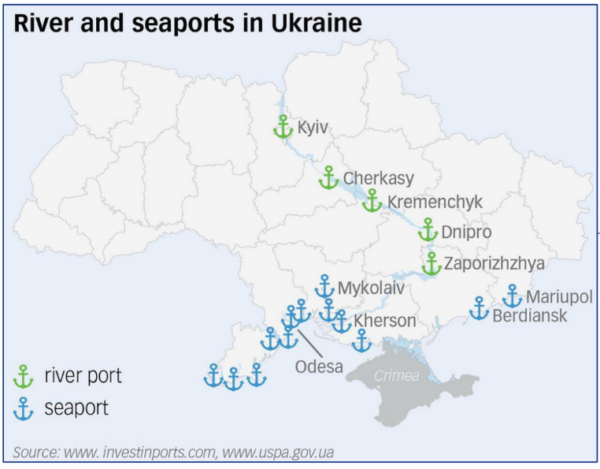 Russia is already exploiting offshore energy resources in the Black Sea, and not least, denying Ukraine the possibility to explore its untapped maritime resources in the sea or at the sea bottom.
Russia is already exploiting offshore energy resources in the Black Sea, and not least, denying Ukraine the possibility to explore its untapped maritime resources in the sea or at the sea bottom.
International freedom of navigation in the Sea of Azov and the Black Sea is also under threat. Additionally, Ukrainian ports are either under Russian occupation (Sevastopol, Alushta, Feodosiya, Yalta, Yevpatoriya, Kerch, Kherson, Berdiansk and Mariupol) or under constant threat of attack. Consequently, commercial vessels (irrespectively of nationality] are unable to enter Ukrainian ports, effectively blocking about 70% of Ukrainian imports and exports. As we have seen, this has a global impact.
As previously stated, the loss of “access to the sea” poses a fundamental threat to Ukraine’s independence and sovereignty.
Ukraine has the will, but not the capabilities needed to change this situation. NATO has the capabilities needed to change it, but not the will to use them.
If the international community wants to avoid the “tsunami of ripple effects” from the war that is fast approaching, this decision needs to be changed.
What does the “tsunami of ripple effects” look like? It is the follow-on consequences of a European country being destroyed while we watch: ongoing atrocities of an extraordinary scale and a Russian attempt to change the demography of Ukraine.
Consequently, Europe has already received nearly 6,3 million refugees and more Ukrainians are on the move. The European Commission reports a “slowdown in growth as war exacerbates pre-existing headwinds”. Energy prices drive inflation to record highs. The risk of starvation is increasing globally due to reduced food security. Costs of food and other basic goods and services are increasing, with households’ purchasing power declining. Uncertainty about supply chains has pressured prices upwards while increasing their volatility.
War-induced logistics and supply chain disruptions, as well as rising input costs for a broad array of raw materials, add to the disturbances in global trade caused by the drastic COVID-19 containment measures still applied in parts of China, weighing on production.
The “tsunami” will increase in strength the longer the war continues. Some of its long-term effects have not yet materialized, including the political ramifications the world has experienced after wars in the last century.
The international community has, however, the means to both end the war and remove its cause.
Fearing the political consequences of becoming militarily involved in Ukraine, the politicians might very well find that they soon will be held accountable for the “tsunami of ripple effects” resulting from not getting involved.

